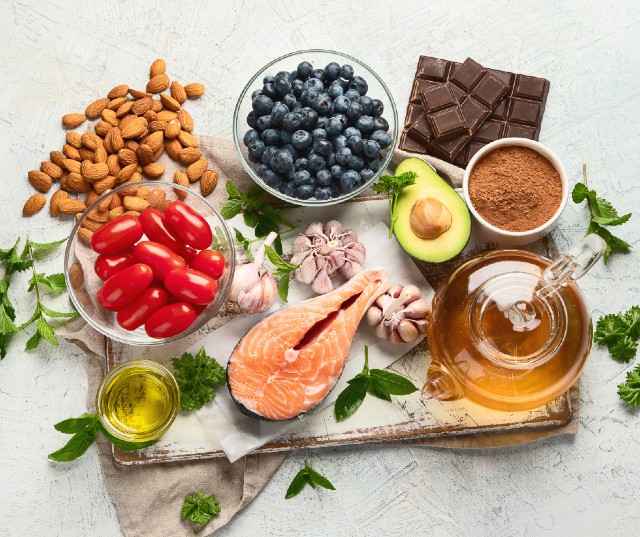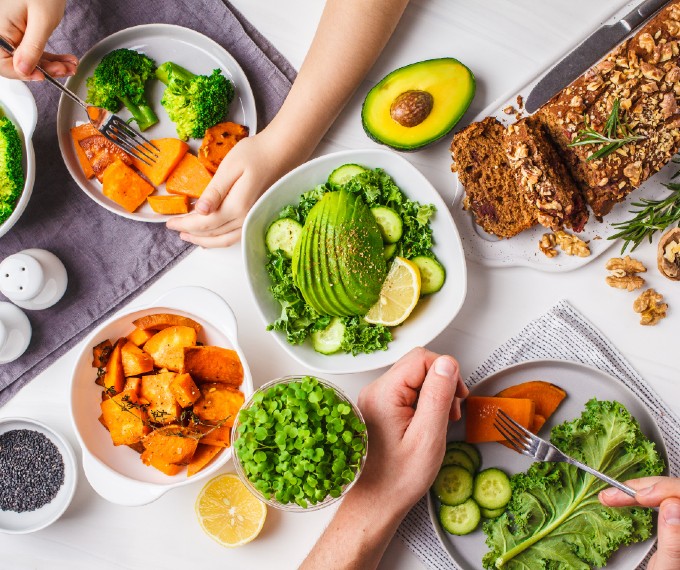Preventing heart disease, diabetes, depression, Alzheimer’s and even cancer doesn’t start at the doctor’s office. It starts at the grocery store. Research shows that you can reduce inflammation by including anti-inflammatory foods in your diet.
As a functional medicine practitioner, the first thing I tell all my patients is to check in with their diet. Changing your diet and eating habits may seem simple, but is revolutionary for your health. That’s why in this article I’m going to share inflammatory foods to avoid and tips for eating hygiene so you have the tools necessary to optimize your health!
Before we start, you’re probably wondering why inflammation is such a big deal.
Your immune system activates anytime it recognizes something foreign to your body like plant pollen or chemicals. It produces an immune response called inflammation that, in small amounts triggered by an invading substance, helps to protect your body.
Unfortunately, sometimes inflammation persists even after the foreign invader is vanquished. It doesn’t help that a lot of the things we put on our body (hello toxic beauty products) and the food we eat encourages inflammation. This is when inflammation becomes dangerous and over prolonged periods of time contributes to the diseases listed above.
Foods That Cause Inflammation
So, what foods cause inflammation? Foods that cause inflammation are hiding in plain sight. They cover the inner aisles of the grocery store and entice you at fast food joints.
An inflammatory diet is identified as one that is high in sugar-sweetened soft drinks, refined grains, diet soft drinks, and processed meat. Reducing or omitting foods that contain added sugars, salt, or trans fats and those that have a high glycemic index or excessive amounts of saturated fats is helpful in lessening the overall inflammatory burden.
Many pesticides are known to impact immune function so increasing consumption of organically grown produce will also lower the inflammatory burden.
Here is a list of inflammatory foods to avoid:
- High fructose corn syrup
- High-sodium foods
- Refined sugar
- Artificial sweeteners
- Hydrogenated or partially hydrogenated oils
Health Risks of Inflammatory Foods
This probably doesn’t come as a surprise to you, but many of the foods that contribute to inflammation are also generally considered bad for your health. For example, most people recognize that soda and sugary sweets like donuts aren’t “healthy.”
Most of these foods are associated with increased risks for chronic diseases such as type 2 diabetes and heart disease. Illnesses that are also associated with excess inflammation.

By reducing your intake of inflammatory foods and increasing your intake of anti-inflammatory foods you can reduce potential health risks and actually optimize your health!
Anti-Inflammatory Foods
Don’t worry, it’s not all doom and gloom, there is good news! By reducing your intake of inflammatory foods and increasing your intake of anti-inflammatory foods you can reduce potential health risks and actually optimize your health!
Here is a list of foods that should be included in an anti-inflammatory diet:
- Tomatoes
- Olive oil
- Green leafy vegetables
- Nuts
- Fatty fish
- Fruits (citrus & berries)
Benefits of Anti-Inflammatory Foods
There are so many benefits of anti-inflammatory foods! Plant-based foods such as fruits, vegetables, and legumes, contain phytonutrients that are shown to have anti-inflammatory effects. Even adding plant-based, anti-inflammatory foods to an inflammatory meal may offset the impact.
For example, high intakes of fat and carbohydrates have been shown to stimulate markers of innate immunity. However, adding orange juice to a high-fat, high-carbohydrate meal was shown to blunt the typical release of endotoxin, potentially due to the flavonoid content of the juice.
It’s amazing just how powerful diet is for your health. We can’t end our discussion here, though.
RELATED: BOOSTING IMMUNITY: 4 PROVEN WAYS TO HELP THE FAMILY STAY WELL
What is Eating Hygiene?
The foods you eat are extremely important to your health. But, more important is what you ABSORB from the food you eat. You may have heard the saying “you are what you eat,” but you are actually what you absorb.
Eating hygiene is the practice of optimizing the nutrients from the food you eat by helping your body absorb it better.
An anti-inflammatory diet has everything to do with WHAT you eat while eating hygiene has everything to do with HOW you eat. It will help maximize your nutrient absorption as well as begin to alleviate mild GI frustrations like acid reflux.
Tips for Eating Hygiene
Practicing good eating hygiene is easy if you can remember these four tips:
Slow Down
It takes 20 minutes for your brain to signal to your gut that you are full and reduce your sense of hunger. If you gulp your food down in ten minutes you are much more likely to overeat and feel bloated after your meal. Try putting your fork down between each bite and taking a deep breath to help you slow down.
Chew
Chewing is the only part of the digestion process that we can control. On average, we chew our food about six times before swallowing. The less we chew our food, the more work our GI tract has to do to digest it. Try chewing your food 20 times before swallowing (this also helps you slow down).
Prioritize Eating
Most of the time we eat while multitasking. You could be driving in the car or simply scrolling on your phone, in both situations you are prioritizing something else above eating. However, eating is crucial to our health. Consider this…
You set aside time to go to a doctor’s appointment, why don’t you set aside time to eat each day? After all, food IS medicine.
Drink Less While Eating
Hydration is another component of good eating hygiene. Contrary to what you might think, the best time to drink water is between meals, not during. Consuming large amounts of water during a meal dilutes the acidity of your stomach acid and slows digestion. Instead, get in the habit of carrying a water glass or bottle around with you throughout the day and sip on it regularly.
Work With a Holistic Health Coach
As a Doctor of Naturopathy and Certified Holistic Health Coach, my goal is to help you achieve optimal health through lifestyle interventions. I use extensive lab testing to identify the root cause of your symptoms. If you’re interested in optimizing your health and changing your lifestyle habits in a joy-filled environment, send me a message!
Your health is never too far gone. With a little direction and the right support, you can live a life of optimal health!
Reach out to me via my contact page to get started!
Mandy Patterson


















